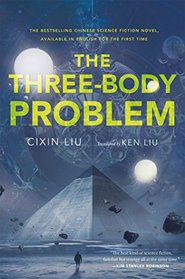Helpful Score: 2
I had never read any works from a modern Chinese author before, and now having completed Cixin Liu's trilogy, my only regret is I didn't know it existed sooner. The mix of history, space, science and tech, was right up my alley, and I was absolutely blown away by the story. It was totally absorbing and best of all, plausible. As part of the tech field, it was exciting to imagine the abilities made possible by tech I was reading about in the trilogy coming to life some day.
I give props to the translator who did a fantastic job, and the footnotes in this first book were a great addition to historical understanding of places and people.
I don't get why this book is only currently getting 2 or 3 stars out of 5 here on PBS. If I could give it more than 5 stars I would!
I give props to the translator who did a fantastic job, and the footnotes in this first book were a great addition to historical understanding of places and people.
I don't get why this book is only currently getting 2 or 3 stars out of 5 here on PBS. If I could give it more than 5 stars I would!
Helpful Score: 1
I love hard science fiction, so when I discovered Cixin Liu's trilogy, beginning with "The Three-Body Problem", I moved through multiple dimensions and galaxies for two weeks. It is amazing to find books in which most of the characters are physicists, living lives confronted with scientific challenges that threaten human as well as universal existence. It is even more amazing to see the technical paths they take to resolve these confrontations. This trilogy is so well imagined and presented that I feel that I have actually traveled into a fourth dimension, ridden a fusion-powered ship, and shared the threats to human civilization presented by the author.
What is even more stunning is that the author and translators present a story that while tailored to Chinese culture, appeals to any culture. This is what the very best science and literature does. Liu's Trilogy, which proceeds from "The Three-Body Problem" to "The Dark Forest" and to "Death's End", presents the darkness in cultures as well as the light; it imagines the structures of cities built in space, evolution toward the feminine and masculine, haunting axioms about the nature of trust in social structures, and the strengths of cynicism balanced against the ultimate need for nurturing.
As a woman, I find some male science fiction writers leaning almost exclusively toward a male perspective; and throughout this series, I was critical of the author for creating a series of weak, even destructive, female characters. I am so glad I resisted the temptation to stop reading. The author ultimately shows that the noblest characteristics in both sexes are what science and the universe requires.
What is even more stunning is that the author and translators present a story that while tailored to Chinese culture, appeals to any culture. This is what the very best science and literature does. Liu's Trilogy, which proceeds from "The Three-Body Problem" to "The Dark Forest" and to "Death's End", presents the darkness in cultures as well as the light; it imagines the structures of cities built in space, evolution toward the feminine and masculine, haunting axioms about the nature of trust in social structures, and the strengths of cynicism balanced against the ultimate need for nurturing.
As a woman, I find some male science fiction writers leaning almost exclusively toward a male perspective; and throughout this series, I was critical of the author for creating a series of weak, even destructive, female characters. I am so glad I resisted the temptation to stop reading. The author ultimately shows that the noblest characteristics in both sexes are what science and the universe requires.




![header=[] body=[Get a free book credit right now by joining the club and listing 5 books you have and are willing to share with other members!] Help icon](/images/question.gif?v=90afaeb39)
